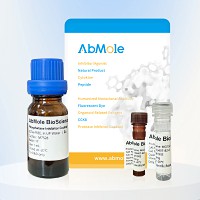All AbMole products are for research use only, cannot be used for human consumption.

The role of Recombinant Human IL-4 Protein (CHO) in the induction of monocytes into DCs is to inhibit the overgrowth of macrophages, thereby directing monocyte differentiation toward DCs. Also, IL-4 has the ability to reduce cell surface expression of CD14 molecules, an important marker for the differentiation of monocytes into DCs. The combined effect of GM-CSF and IL-4 can lead to targeted differentiation of monocytes into immature DCs, which have a strong capacity for antigen uptake and processing, but a weak capacity for antigen presentation.
DNA sequence encoding human IL-4 ( GenBank: AAH70123.1 H25-S153 ) expressed with an Fc tag at the C- terminus.
Measured by the cell proliferation assay with TF-1 cells, the ED50 is ≤0.5 ng/mL.
Endotoxin <0.1 EU/μg

Eur J Med Res. 2025 Apr 11;30(1):271.
M2 macrophage-derived exosomes reverse TGF-β1-induced epithelial mesenchymal transformation in BEAS-2B cells via the TGF-βRI/Smad2/3 signaling pathway
Recombinant Human IL-4 Protein (CHO, C-Fc) purchased from AbMole

Patent. CN119138406A 2024 Dec 17.
Patent. CN119138406A
Recombinant Human IL-4 Protein (CHO, C-Fc) purchased from AbMole
| Form | Lyophilized powder |
| Solubility (25°C) | Reconstitute the lyophilized powder in ddH2O or PBS up to 100 μg/ml. |
| Storage | Stored at ≤-20°C, stable for one year after receipt. Reconstituted protein solution can be stored at 2-8°C for 2-7 days and at -20°C for 3 months. |
| Related Cytokines and Growth Factors Products |
|---|
| Recombinant Human GDF-15 Protein (HEK293 N-hFc)
Growth-differentiation factor 15 (GDF15), also known as MIC-1, is a secreted member of the transforming growth factor (TGF)-β superfamily. GDF-15 has a role in regulating inflammatory and apoptotic pathways in injured tissues and during disease processes. GDF-15 overexpression arising from an expanded erythroid compartment contributes to iron overload in thalassemia syndromes by inhibiting hepcidin expression. |
| Recombinant Human FGFR1 Protein (HEK293, C-His)
FGFR1, also known as CD331, is a full-length representative protein consists of an extracellular region, composed of three immunoglobulin-like domains, a single hydrophobic membrane-spanning segment and a cytoplasmic tyrosine kinase domain. |
| Recombinant Human FGFR2 Protein (HEK293, C-His)
FGFR2, also known as CD332, acts as cell-surface receptor for fibroblast growth factors and plays an essential role in the regulation of cell proliferation, differentiation, migration and apoptosis, and in the regulation of embryonic development. FGFR2 plays an essential role in the regulation of osteoblast differentiation, proliferation and apoptosis, and is required for normal skeleton development. It also promotes cell proliferation in keratinocytes and imature osteoblasts, but promotes apoptosis in differentiated osteoblasts. |
| Recombinant Mouse BMP-4 Protein (E. coli, C-His)
Bone Morphogenetic Protein-4 (BMP-4) is a critical signaling molecule required for the early differentiation of the embryo and establishing of a dorsal-ventral axis. BMP-4 is secreted from the dorsal portion of the notochord, and it acts in concert with sonic hedgehog to establish a dorsal-ventral axis for the differentiation of later structures. |
| Recombinant Human Coagulation Factor X (HEK293, C-Fc)
Coagulation factor X, belongs to the peptidase S1 family. Coagulation factor X is initially synthesized in the liver. Coagulation factor X is a vitamin K-dependent glycoprotein that converts prothrombin to thrombin in the presence of factor Va, calcium and phospholipid during blood clotting. |
All AbMole products are for research use only, cannot be used for human consumption or veterinary use. We do not provide products or services to individuals. Please comply with the intended use and do not use AbMole products for any other purpose.


Products are for research use only. Not for human use. We do not sell to patients.
© Copyright 2010-2024 AbMole BioScience. All Rights Reserved.
